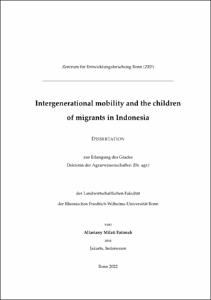Fatimah, Alfariany Milati: Intergenerational Mobility and the Children of Migrants in Indonesia. - Bonn, 2022. - Dissertation, Rheinische Friedrich-Wilhelms-Universität Bonn.
Online-Ausgabe in bonndoc: https://nbn-resolving.org/urn:nbn:de:hbz:5-65466
Online-Ausgabe in bonndoc: https://nbn-resolving.org/urn:nbn:de:hbz:5-65466
@phdthesis{handle:20.500.11811/9644,
urn: https://nbn-resolving.org/urn:nbn:de:hbz:5-65466,
author = {{Alfariany Milati Fatimah}},
title = {Intergenerational Mobility and the Children of Migrants in Indonesia},
school = {Rheinische Friedrich-Wilhelms-Universität Bonn},
year = 2022,
month = feb,
note = {Although there has been substantial increase in human development in Indonesia, individual inequality has not reduced significantly.
This dissertation focuses on intergenerational mobility and its interplay with internal migration. It analyses the impact of parental migration on their children’s long-term outcomes as adults. The main data for the quantitative analysis was drawn from the Indonesian Family Life Survey. Endogenous treatment regression was used to address the self-selection bias of migration. This dissertation analyses three aspects of intergenerational mobility: expenditures, education and occupation. It examines long-term impacts of childhood shocks from parental migration and the Asian financial crisis. An analysis of intergenerational expenditure mobility finds that the children of migrants have higher education levels and higher per capita expenditure than the children of non-migrants. However, migrants’ children only have more intergenerational expenditure mobility than children of non-migrants if they live in urban areas in their adulthood, migrated as children, or if their parents belonged to the poorest quintile of studied households.
Exploring educational aspects, the dissertation examines if household and parental migration were able to mitigate the impact of children dropping out of school during the Asian financial crisis. Children who dropped out have on average 1.3 years less of schooling than those who stayed in school. However, I find that these differences have no long-term impact on children’s future income and their probability of working in the agricultural sector. Migration only helped keeping children in school in the case of households that moved to a rural area and that experienced a negative food shock during the financial crisis.
I also find that migration has a positive impact on gaining job with higher occupational skills, yet to a varying degree across different ethnic groups. There is an indication of the existence of ethnic employment niches in Indonesia. Therefore, migrants are more likely to be employed in sectors dominated by their own ethnic group, which makes an occupation-education mismatch more likely among migrants compared to non-migrants. In addition, among migrants in the lowest occupational skill level, parental migration promotes intergenerational upward mobility.
Altogether, this dissertation contributes to the literature on intergenerational mobility, migration and human capital theory and adds to the scant literature on the long-term impact of parental internal migration.},
url = {https://hdl.handle.net/20.500.11811/9644}
}
urn: https://nbn-resolving.org/urn:nbn:de:hbz:5-65466,
author = {{Alfariany Milati Fatimah}},
title = {Intergenerational Mobility and the Children of Migrants in Indonesia},
school = {Rheinische Friedrich-Wilhelms-Universität Bonn},
year = 2022,
month = feb,
note = {Although there has been substantial increase in human development in Indonesia, individual inequality has not reduced significantly.
This dissertation focuses on intergenerational mobility and its interplay with internal migration. It analyses the impact of parental migration on their children’s long-term outcomes as adults. The main data for the quantitative analysis was drawn from the Indonesian Family Life Survey. Endogenous treatment regression was used to address the self-selection bias of migration. This dissertation analyses three aspects of intergenerational mobility: expenditures, education and occupation. It examines long-term impacts of childhood shocks from parental migration and the Asian financial crisis. An analysis of intergenerational expenditure mobility finds that the children of migrants have higher education levels and higher per capita expenditure than the children of non-migrants. However, migrants’ children only have more intergenerational expenditure mobility than children of non-migrants if they live in urban areas in their adulthood, migrated as children, or if their parents belonged to the poorest quintile of studied households.
Exploring educational aspects, the dissertation examines if household and parental migration were able to mitigate the impact of children dropping out of school during the Asian financial crisis. Children who dropped out have on average 1.3 years less of schooling than those who stayed in school. However, I find that these differences have no long-term impact on children’s future income and their probability of working in the agricultural sector. Migration only helped keeping children in school in the case of households that moved to a rural area and that experienced a negative food shock during the financial crisis.
I also find that migration has a positive impact on gaining job with higher occupational skills, yet to a varying degree across different ethnic groups. There is an indication of the existence of ethnic employment niches in Indonesia. Therefore, migrants are more likely to be employed in sectors dominated by their own ethnic group, which makes an occupation-education mismatch more likely among migrants compared to non-migrants. In addition, among migrants in the lowest occupational skill level, parental migration promotes intergenerational upward mobility.
Altogether, this dissertation contributes to the literature on intergenerational mobility, migration and human capital theory and adds to the scant literature on the long-term impact of parental internal migration.},
url = {https://hdl.handle.net/20.500.11811/9644}
}






